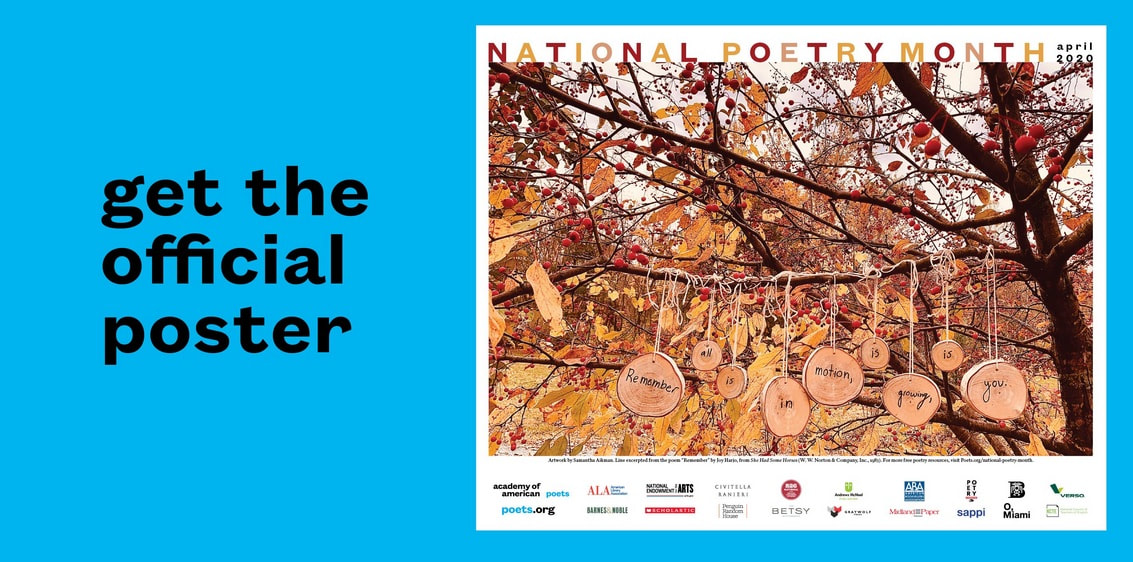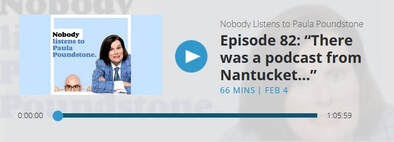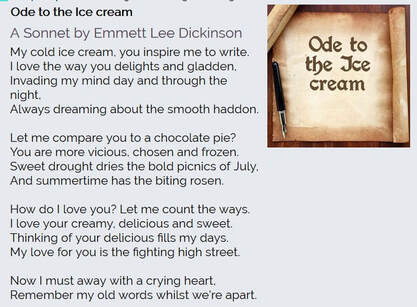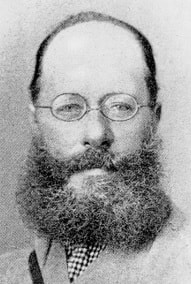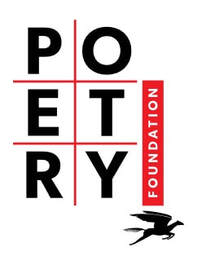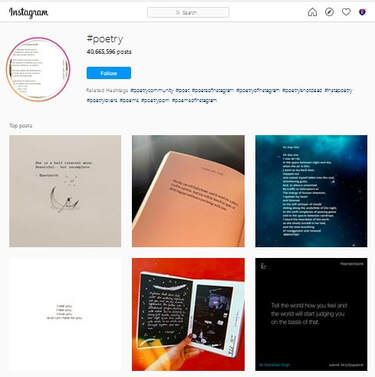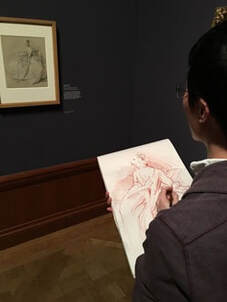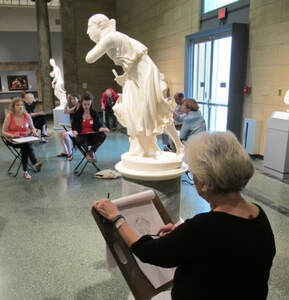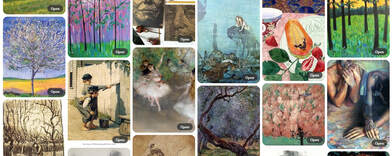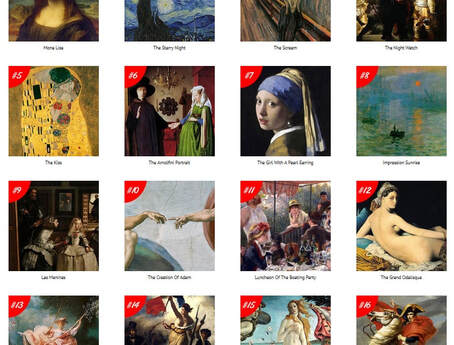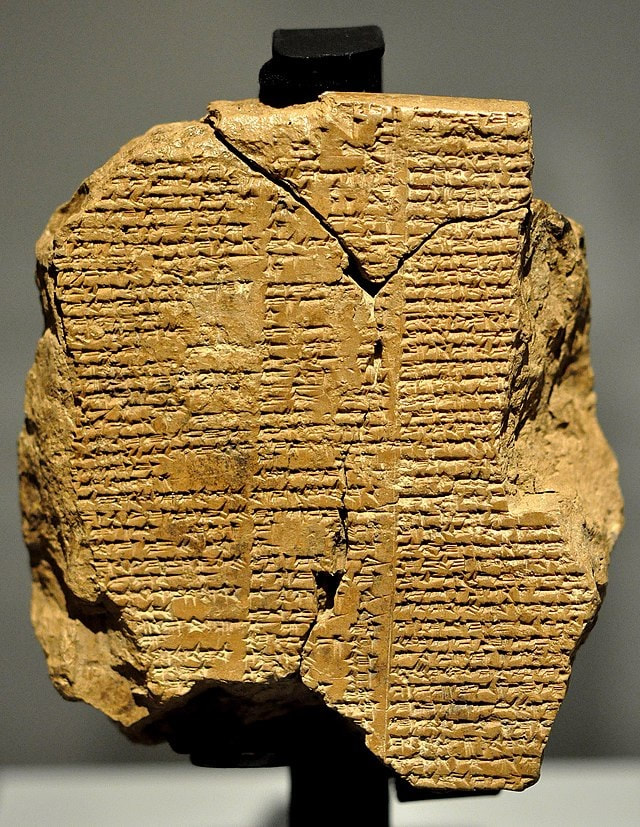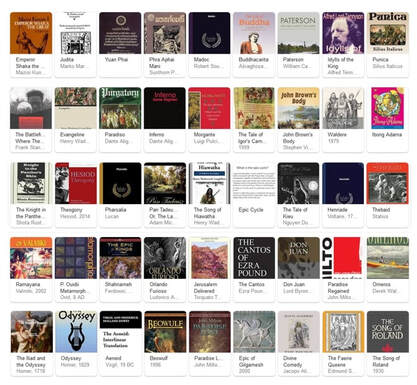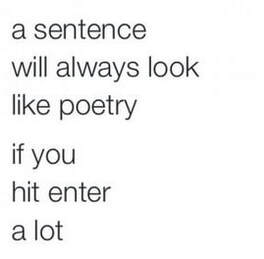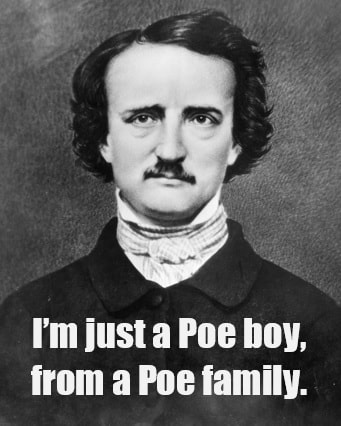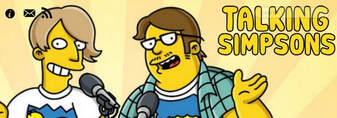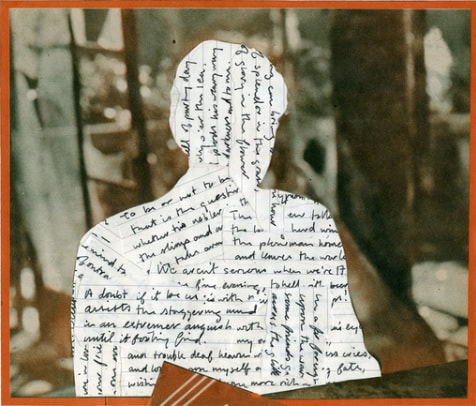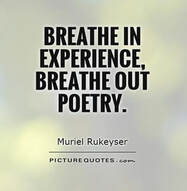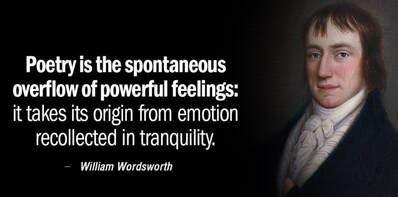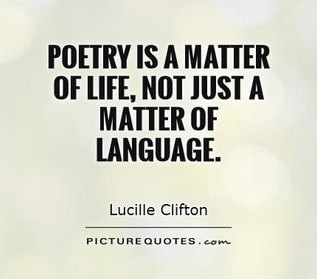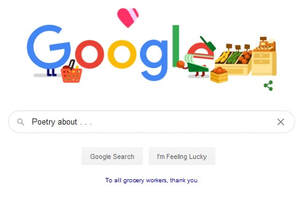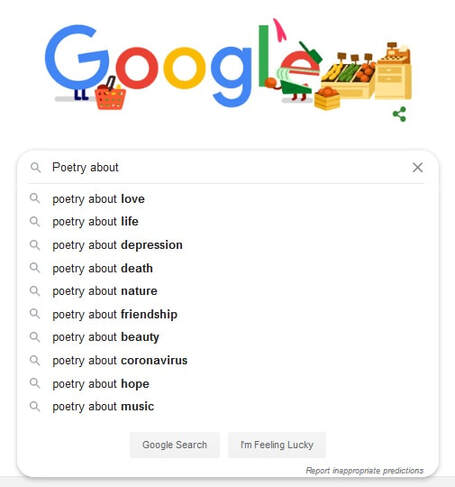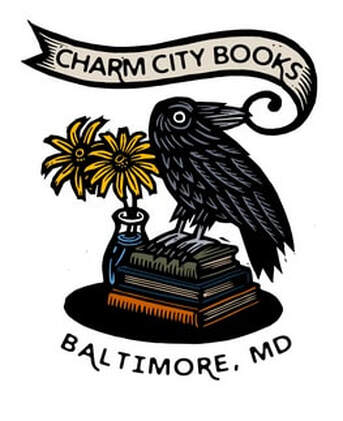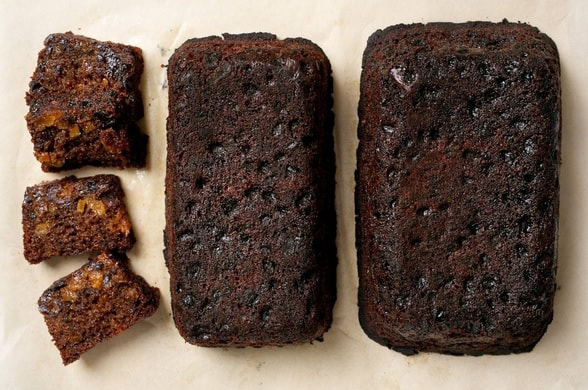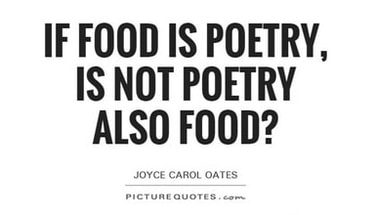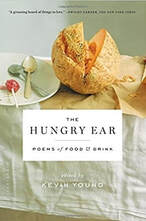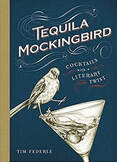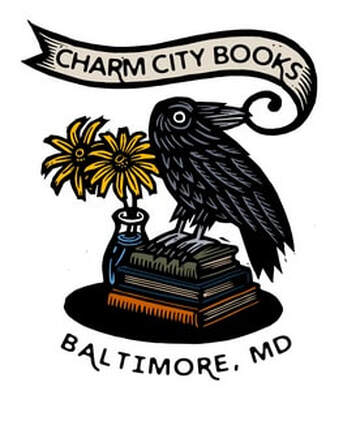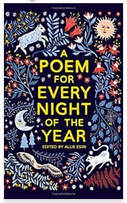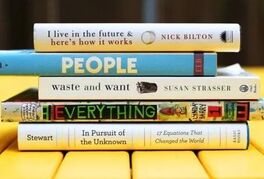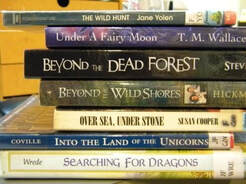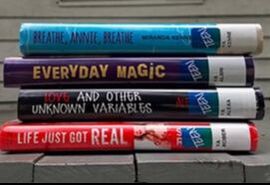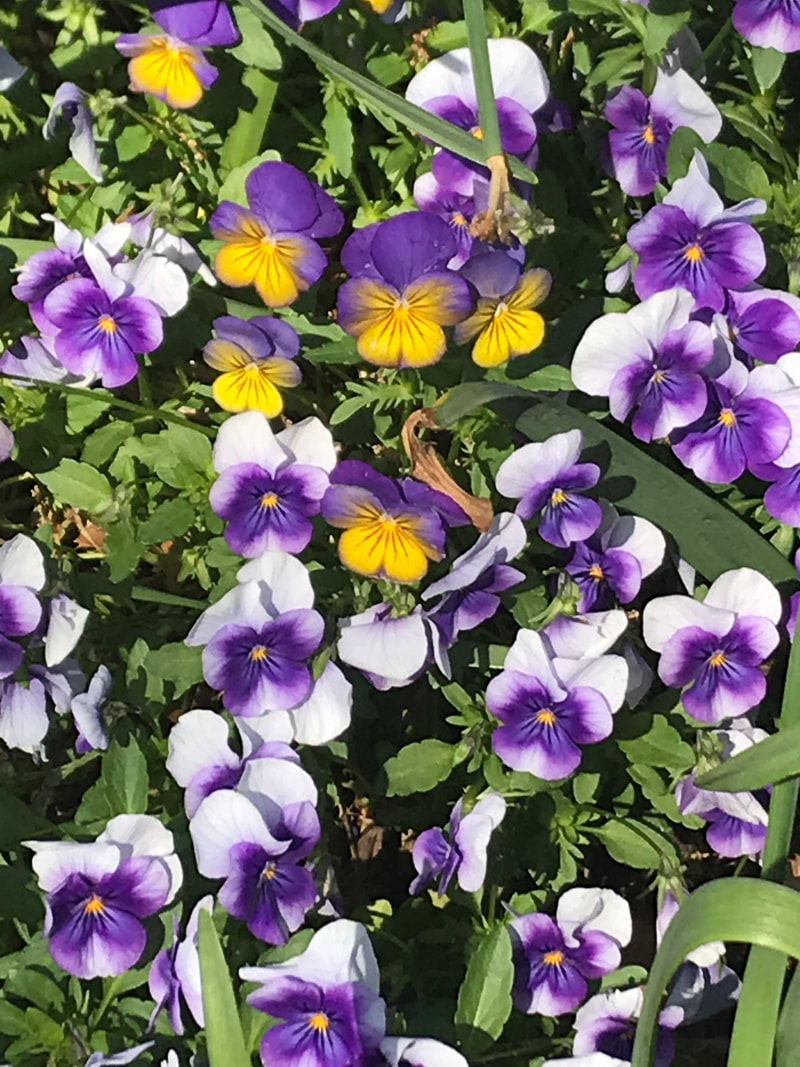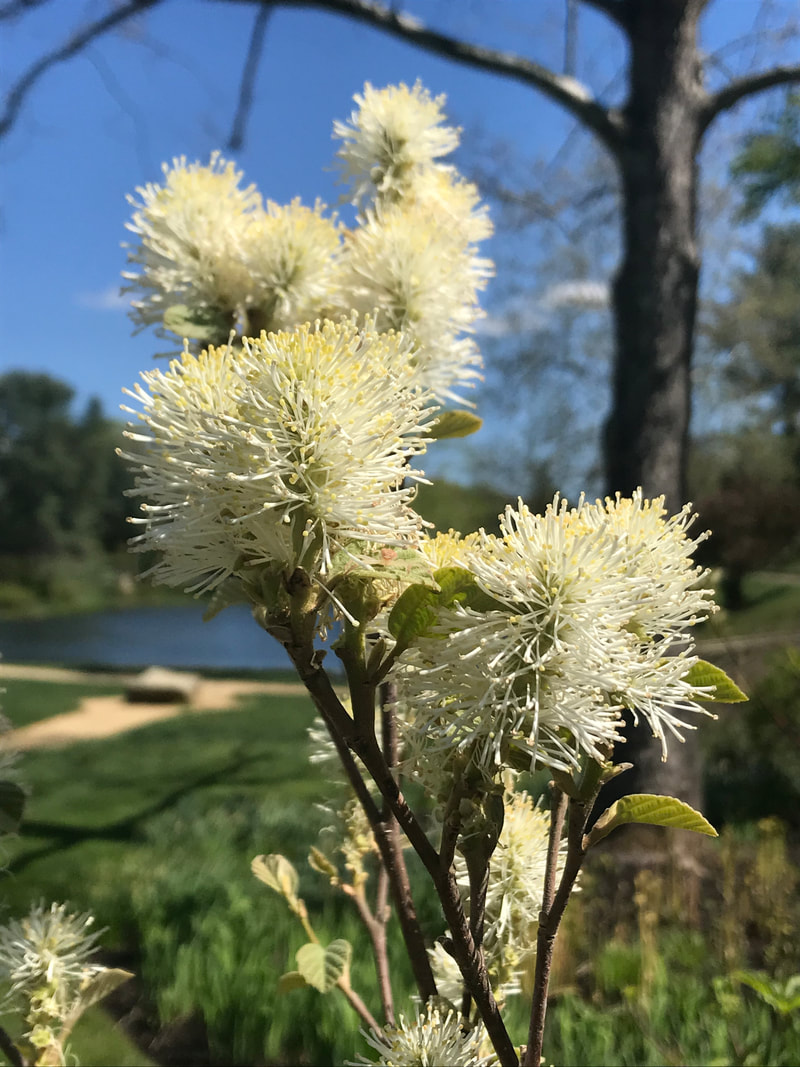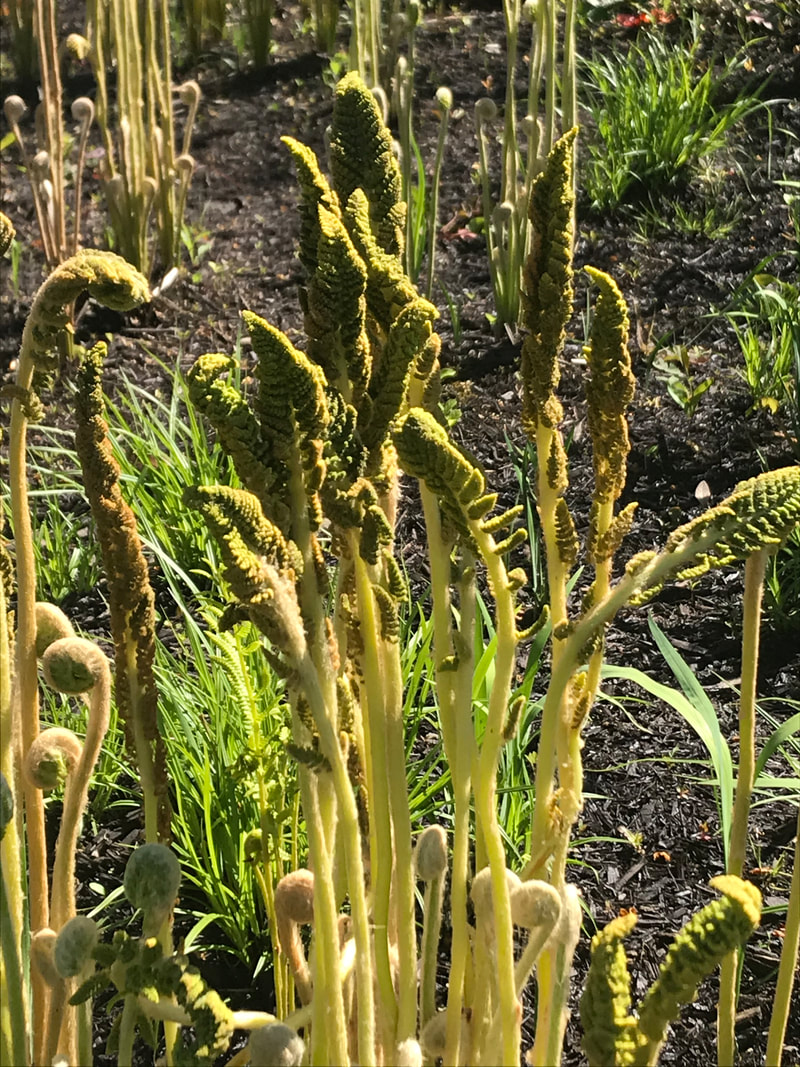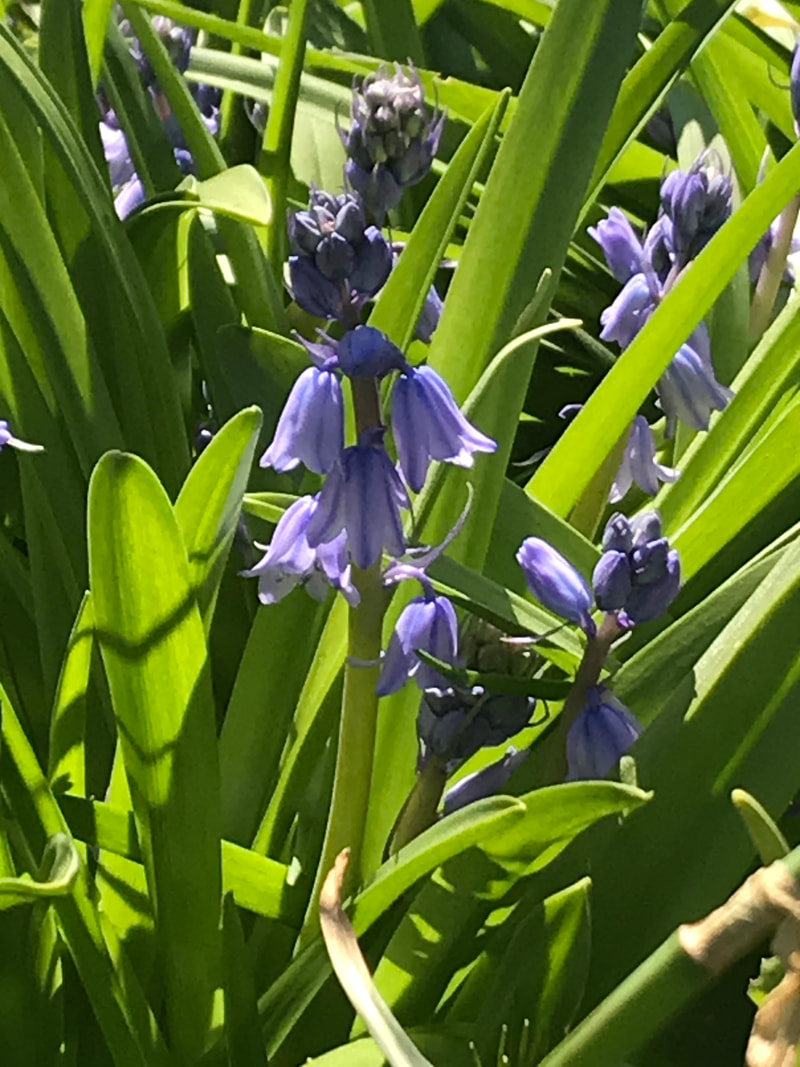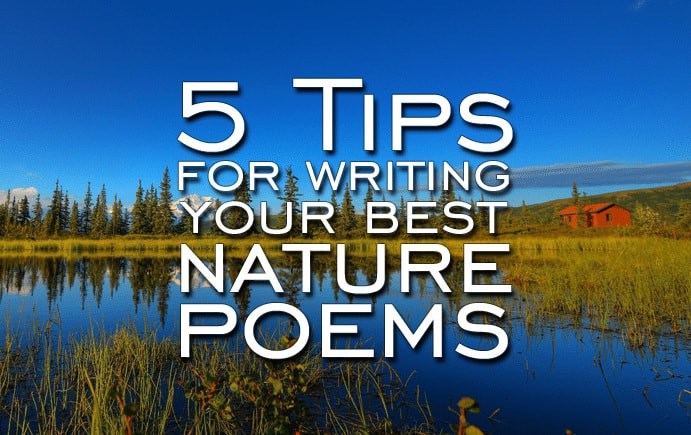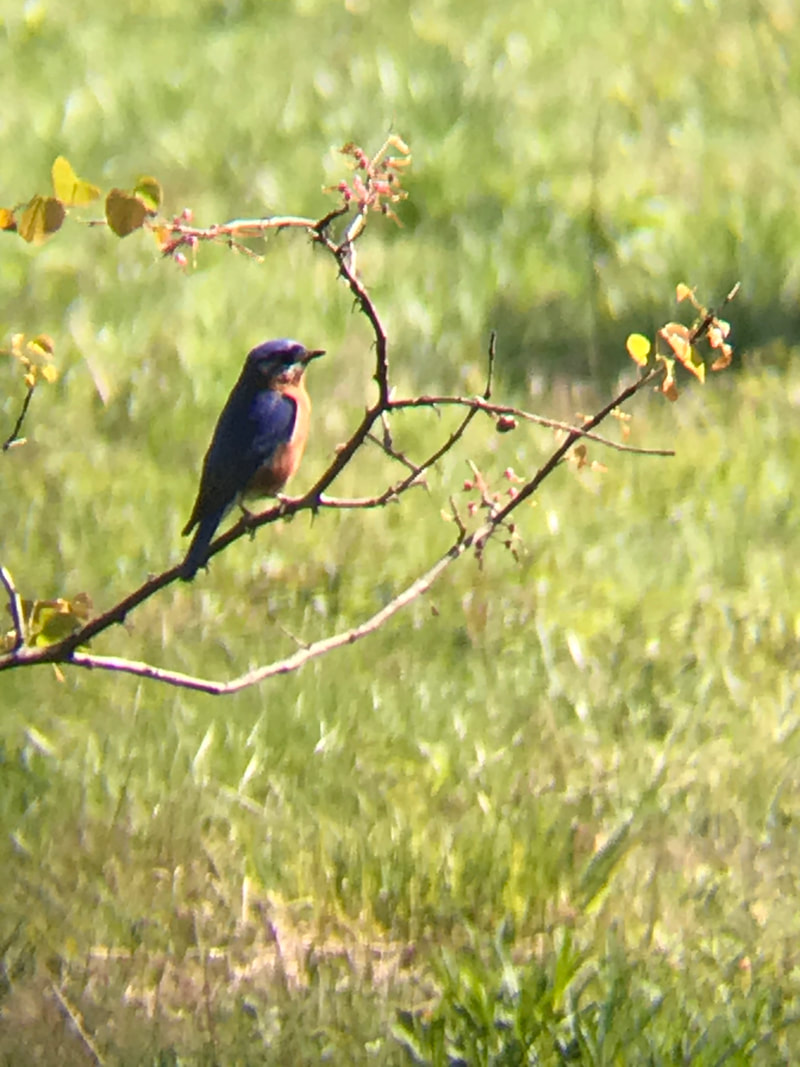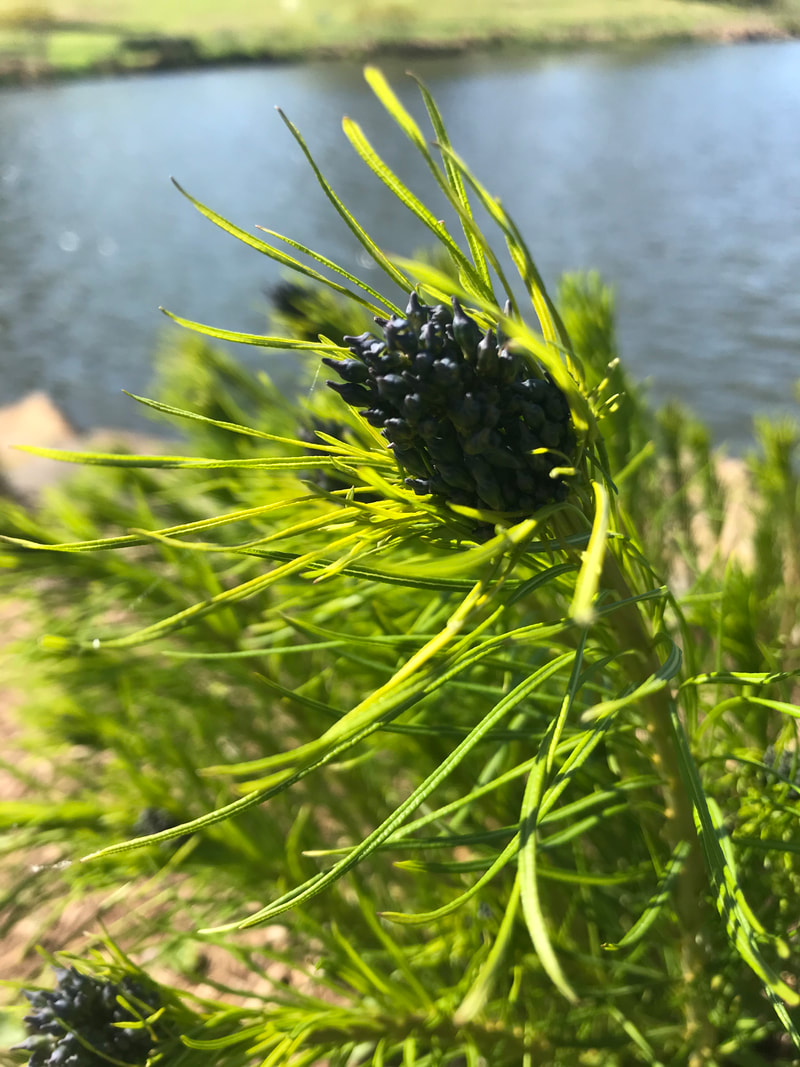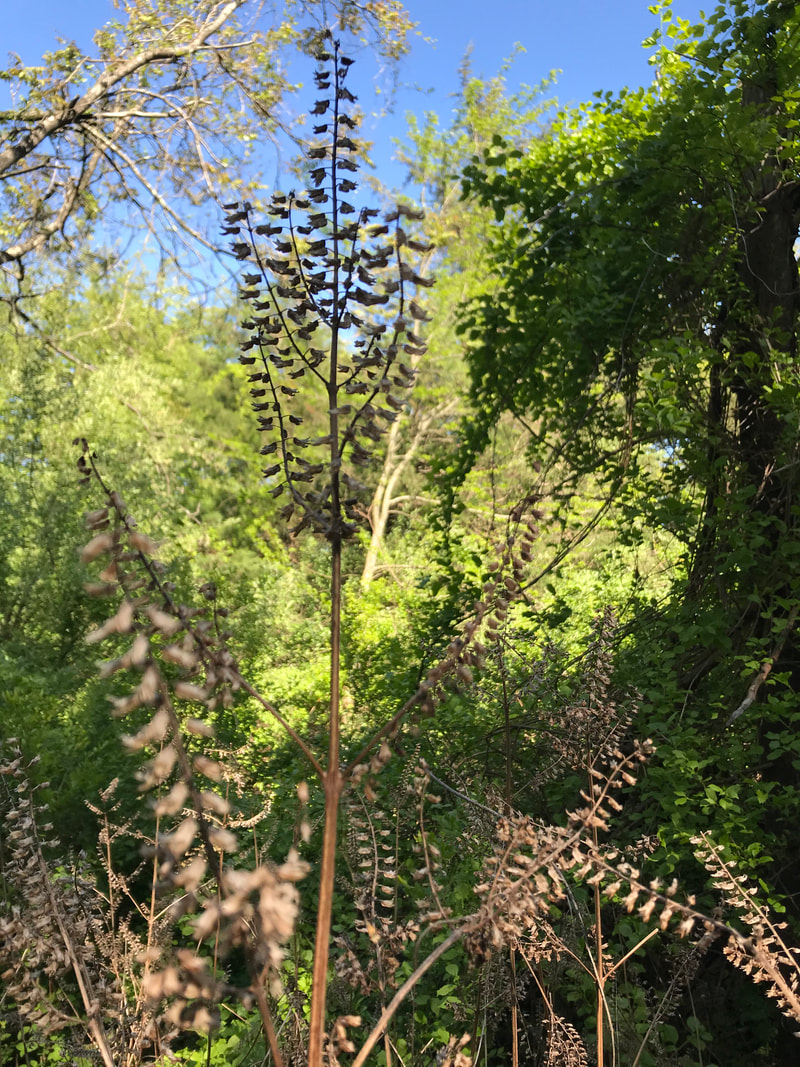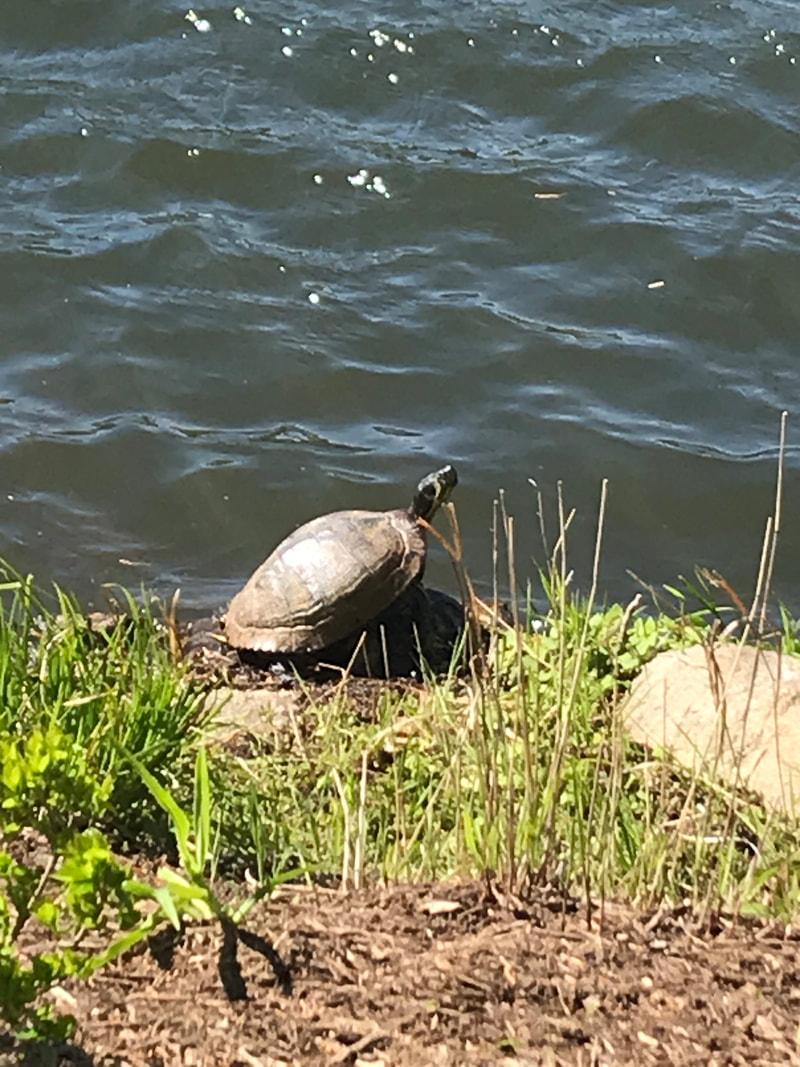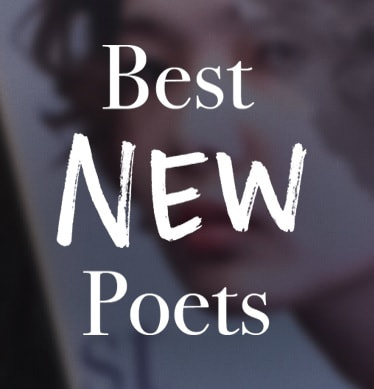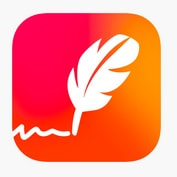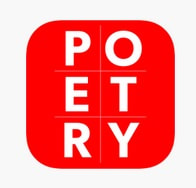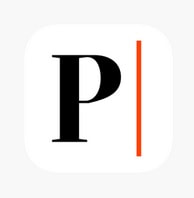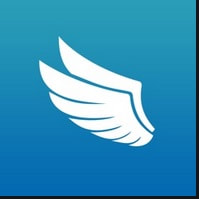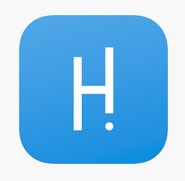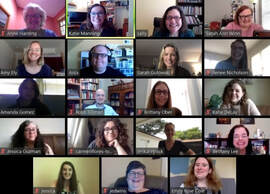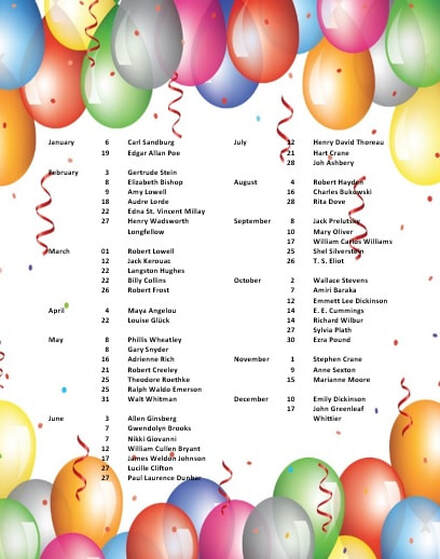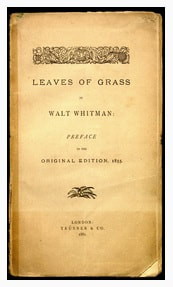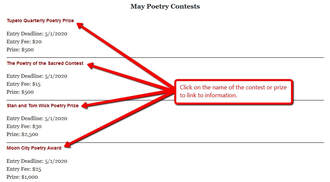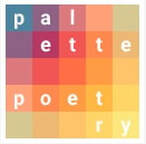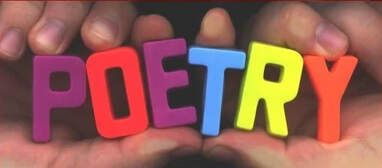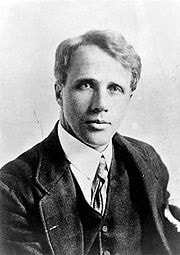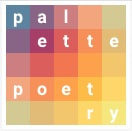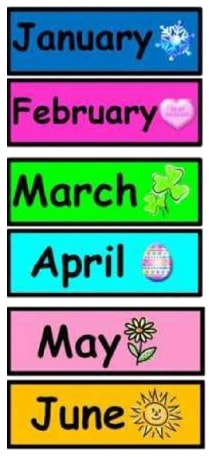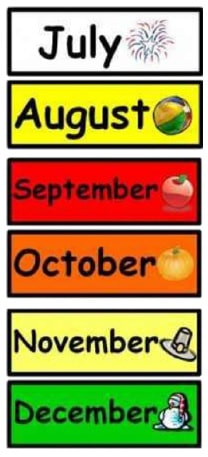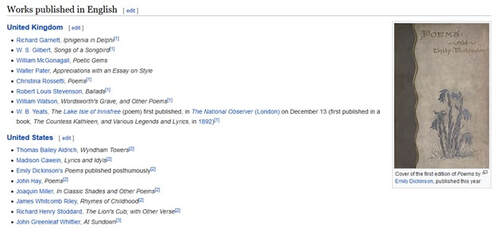APRIL 2020:
In April 2019 we introduced the Poetic New Deal (click HERE). Now, in April 2020 -- National Poetry Month -- we expand the deal!
Poetry lovers, stay tuned! |
“If I read a book and it makes my whole body so cold no fire can ever warm me, I know that is poetry. If I feel physically as if the top of my head were taken off,
I know that is poetry. These are the only ways I know it. Is there any other way?” ~ Emily Dickinson
I know that is poetry. These are the only ways I know it. Is there any other way?” ~ Emily Dickinson
BEFORE NATIONAL POETRY MONTH BEGINS...
|
Before National Poetry Month begins,
check out the offer for a free poster at the Academy of American Poets -- HERE. |
"Prose: words in their best order; poetry: the best words in the best order."
~ Samuel Taylor Coleridge
~ Samuel Taylor Coleridge
April 1: Read a Sonnet
Let's jump into National Poetry Month with some serious stuff -- the sonnet. Info from LiteraryDevices.net: "The word sonnet is derived from the Italian word “sonetto,” which means a “little song” or small lyric. In poetry, a sonnet has 14 lines, and is written in iambic pentameter. Each line has 10 syllables. It has a specific rhyme scheme, and a volta, or a specific turn.
|
The six major types of sonnets are the following
|
Depending upon when you read this, it is currently 2020 and we are "social distancing" due to the global COVID-19 virus -- and at this time, Patrick Stewart is reading a Shakespeare sonnet a day on Instagram (@SirPatStew). For information, click HERE.
|
April 2: Write a Sonnet
|
Okay, so now that you've learned a bit about a sonnet (above), you've read a sonnet, and maybe you've listened to a sonnet (compliments of Patrick Stewart), now it's time to try your hand at writing a sonnet.
Where to begin? Well, let's start with "How to write a sonnet" at No Sweat Shakespeare, HERE. |
If you are completely stuck, then perhaps you can start with the "Sonnet Generator" -- HERE.
We gave it a try, and below are the words we entered into the generator (below on the left), and the final result (below on the right).
We gave it a try, and below are the words we entered into the generator (below on the left), and the final result (below on the right).
Okay, we'll admit that the final result was a bit strange:
* Line 1: The first line has eleven syllables -- but that's easy enough to fix: just remove "cold" or "my" (or say "Sweet" in place of "My cold").
* Line 2: The "s" on the verb "delight" was my fault -- that is how I entered it (instead of just listing "delight").
* Line 4: "About the smooth haddon"? Okay, that's just weird (but obviously the generator had to rhyme "gladden").
* Line 6: Hmm...where did "vicious" come from? I thought maybe auto-correct had changed "luscious" to vicious" -- but it turns out I didn't type "luscious" in my list of adjectives.
* Line 8 Again, that's just weird.
* Lines 9 to 12: Okay, they got off to a good start -- although line 10 veered off track -- and line 12? My love for ice cream "is the fighting high street"? Huh?
* Final Couplet: Not bad -- I'm sure a standard pair of lines in the generator, but at least they make sense.
However, if in fact you are stuck with writing a sonnet, try the generator, and then copy and paste the result on a Word doc and play around with it. We took the result for our "ice cream" sonnet (above right), and here's what we did with it:
* Line 1: The first line has eleven syllables -- but that's easy enough to fix: just remove "cold" or "my" (or say "Sweet" in place of "My cold").
* Line 2: The "s" on the verb "delight" was my fault -- that is how I entered it (instead of just listing "delight").
* Line 4: "About the smooth haddon"? Okay, that's just weird (but obviously the generator had to rhyme "gladden").
* Line 6: Hmm...where did "vicious" come from? I thought maybe auto-correct had changed "luscious" to vicious" -- but it turns out I didn't type "luscious" in my list of adjectives.
* Line 8 Again, that's just weird.
* Lines 9 to 12: Okay, they got off to a good start -- although line 10 veered off track -- and line 12? My love for ice cream "is the fighting high street"? Huh?
* Final Couplet: Not bad -- I'm sure a standard pair of lines in the generator, but at least they make sense.
However, if in fact you are stuck with writing a sonnet, try the generator, and then copy and paste the result on a Word doc and play around with it. We took the result for our "ice cream" sonnet (above right), and here's what we did with it:
|
A Sonnet by Emmett Lee Dickinson
Sweet ice cream, you inspire me to write. I love the way you delight and gladden, Invading my mind day and through the night, Always cheering me when I am saddened. Let me compare you to a chocolate pie? You are more luscious, creamy and frozen. Sweet cones delight bold picnics of July, And summertime becomes so ambrosian. How do I love you? Let me count the ways. I love your creamy, sweet, delicious taste. Thinking of your flavor doth fills my days. My endless love for you, though, grows my waist. Now I must away with a crying heart, Remember my old words whilst we're apart. |
Once you have completed your sonnet, try your hand at whipping up the "Easiest-Ever Fruit and Coconut Ice Cream" from the Good Housekeeping Test Kitchen.
The recipe is HERE -- and from that picture above, we tend to believe that it's beyond delicious. In fact, it looks like it's pure poetry! |
April 3: Read and/or Write A Limerick
Okay, we started off National Poetry Month with some serious stuff – sonnets. Let’s now turn to the limerick, something more a little more lighthearted – and often bit more bawdy:
The limerick packs laughs anatomical
In space that is quite economical.
The good ones I’ve seen
So seldom are clean
And the clean ones so seldom are comical.
Reader's Digest has this post, "8 Funny Limericks Only Clever People Will Get," HERE. This page includes a history timeline for the limerick, and it includes the "Best Limericks of All Time" -- HERE. Twelve of the"best and funniest" limericks ever written are HERE, and 75 limericks "guaranteed to make you smile" are HERE.
The limerick packs laughs anatomical
In space that is quite economical.
The good ones I’ve seen
So seldom are clean
And the clean ones so seldom are comical.
Reader's Digest has this post, "8 Funny Limericks Only Clever People Will Get," HERE. This page includes a history timeline for the limerick, and it includes the "Best Limericks of All Time" -- HERE. Twelve of the"best and funniest" limericks ever written are HERE, and 75 limericks "guaranteed to make you smile" are HERE.
|
A flea and a fly in a flue Were imprisoned, so what could they do? Said the fly, "let us flee!" "Let us fly!" said the flea. So they flew through a flaw in the flue. ~ Ogden Nash |
National Limerick Day is set on 12th May to mark the birthday of Edward Lear (pictured at the right), the English writer known for his works of nonsensical prose and poetry. It was Edward Lear who was to popularise the Limerick in his “A Book of Nonsense”, published 1846. His limericks were popular then and this form of nonsense literature has managed to retain its appeal to this day. |
|
And what of Nantucket?
"There once was a man from Nantucket" is the opening line for many limericks, in which the name of the island of Nantucket creates often ribald rhymes and puns. The protagonist in the obscene versions is typically portrayed as well-endowed and hypersexualized. The earliest published version of a Nantucket limerick appeared in 1902 in the Princeton Tiger written by Prof. Dayton Voorhees: There once was a man from Nantucket Who kept all his cash in a bucket. But his daughter, named Nan, Ran away with a man And as for the bucket, Nantucket. |
|
|
|
There once was a poet from Amherst
Whose outlook on nature was well-versed. She'd jot down some lines And maybe some rhymes -- Or endings – she hoped – that would come close ~ Emmett Lee Dickinson (about his third cousin -- and her...um...inventive rhymes) |
April 4: Download Free Poetry
|
In celebration of National Poetry Month, the Poetry Foundation is offering readers a free download of their April 2020 issue of Poetry! Information is HERE.
You can also download free poetry collections at obooko.com: “Every e-book on obooko is distributed with the author's written permission in compliance with U.S., U.K. and international Copyright law.” Their site is HERE, and poetry collections are HERE. |
April 5: Follow a Poetry Account on Instagram
During last year's celebration of National Poetry Month, we suggested one should "follow a poetry account on Twitter" (click HERE and scroll down to the post dated April 26). Did you know that there are also plenty of poetry accounts to follow on Instagram?
|
Pictured at the left: Some of the images (with poetry) that come up when I searched the hashtag #poetry on Instagram (click the image to enlarge).
Pictured below: I also ran a Google-search for "insta poets," and these were some of the accounts Google spotlighted (click the image to enlarge). Last March Vogue ran an article entitled "The Rise of the Insta-Poet: 6 Modern Bards you Should Be Following" -- click HERE.
Andrew Lloyd at Vice.com wrote "I Faked My Way as an Instagram Poet, and It Went Bizarrely Well": "I decided to find out whether Instagram poetry took real talent, or if the whole thing is a sham, by becoming the worst poet the Internet has ever seen" -- HERE: |
April 6: Listen to a Poetry Book on Tape
|
Many people listen to books on tape, but have you ever listened to a poetry book on tape?
When we first started exploring poetry books on tape, we found this: Click HERE to access the article.
|
The Audible site for 2018 awards says this, "Without a doubt, poetry is having a moment right now, which is why we brought it back as a category this year."
Hmm...we wonder what that moment consisted of, because when we checked the Audible site for the 2019 awards, poetry was not included -- HERE. Has poetry's moment come and gone? Well, they might not present an award in poetry any more, but they do have plenty of poetry titles to listen to -- HERE.
Hmm...we wonder what that moment consisted of, because when we checked the Audible site for the 2019 awards, poetry was not included -- HERE. Has poetry's moment come and gone? Well, they might not present an award in poetry any more, but they do have plenty of poetry titles to listen to -- HERE.
|
We also found this on Bustle.com: "Poetry Audiobooks DO Exist -- And You Can Listen These 6 Right Now" -- HERE. |
Below: These are the titles that popped up when we Googled "poetry books on tape":
April 7: Write a Poem Inspired by Artwork
You know how artists sketch artworks lining the galleries of art museums? Well, visit a museum (after they reopen after the coronoavirus pandemic, of course) and write poetic lines inspired by some of the artwork there. While museums are closed, visit museums virtually and/or just Google-search the works of some of your favorite artists for inspiration.
Check this out: "Tired of Netflix? 14 World-Class Museums Offering Virtual Tours Right From Your Laptop" -- HERE.
|
Need some inspiration? Check out this page with "54 Best Underrated Masterpieces" -- HERE. Pick one of those and see what you end up with when you put pen to paper.
|
Want inspiration from a more famous artwork? Check out the world's "Top 100 Masterpieces" -- HERE.
|
April 8: Read a Poem about an Historic Event
Listen my children, and you shall hear, the tale of an iceberg that came too near.
That's right -- you can read all about Paul Revere if you want to (HERE) -- but one of my favorite poems about an historic event is "The Convergence of the Twain, Lines on the Loss of the 'Titanic'" by Thomas Hardy. Click HERE.
That's right -- you can read all about Paul Revere if you want to (HERE) -- but one of my favorite poems about an historic event is "The Convergence of the Twain, Lines on the Loss of the 'Titanic'" by Thomas Hardy. Click HERE.
|
We found a short list of historical poems HERE and HERE -- and another short list with some more contemporary poems is HERE.
|
A very famous poem about American history -- "Concord Hymn" by Ralph Waldo Emerson -- includes the world-famous "shot heard round the world."
|
By the rude bridge that arched the flood, Their flag to April’s breeze unfurled, Here once the embattled farmers stood And fired the shot heard round the world. The complete poem is HERE.
|
One last tidbit of interest -- it's not a poem -- but take a look at this description for a class at Yale called "Teaching History through Poetry," HERE. Various poem titles are listed including Maya Angelou's "Still I Rise" (HERE) and Gary Soto's "Ode to Los Raspados" (HERE).
April 9: Read an Epic Poem
Quarantined? No place to go? Lots of time on your hands? Why not take time to read an epic poem?
|
The definition above, the characteristics of an epic poem below, and more are from Masterclass.com, HERE.
An epic poem... * Is written in a formal style * Contains third-person narration and an omniscient narrator * Frequently invokes a Muse who provides inspiration and guidance to the poet * Takes place in an era beyond the range of any living memory * Typically includes a journey across a variety of settings and terrains * Features a hero with immense bravery and resolve * Includes obstacles and circumstances that are otherworldly and even supernatural—pitting the hero against nearly insurmountable odds * Looks with concern to the future of a civilization or culture For a complete list of epic poems click HERE. Want to narrow it down a bit? For "The 20 Greatest Epic Poems of All Time," click HERE. |
April 10: Tell Jokes about Poetry
"What's a metaphor," you ask.
It's fer grazin' your cattle.
Did you laught? Should I say "ba-dump-bump"? Since our 4/9 entry above was so serious (epic poems, ya know), we thought we'd go silly today -- with jokes and puns about poetry.
It's fer grazin' your cattle.
Did you laught? Should I say "ba-dump-bump"? Since our 4/9 entry above was so serious (epic poems, ya know), we thought we'd go silly today -- with jokes and puns about poetry.
|
While we're mixing poetry with humor, check this out: A February 2018 episode of the podcast "Talking Simpsons," about "Bart Sells His Soul" (the fourth episode of The Simpsons' seventh season); The episode includes "spirituality, restaurants, and pogs all in one episode" -- AND the podcast has Glenn Close reading part of poem by Pablo Neruda. Listen HERE. The discussion about Neruda comes in at 36:40 through 40:20 (and it includes a connection to the TV show "How I Met Your Mother."
|
|
April 11: Memorize a Poem
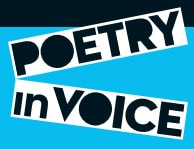
Why not memorize a poem? I mean -- why not? You've got the time if you're quarantined for the COVID19 pandemic.
From Poetry in Voice, here are "Tips for memorizing your poem"
From Poetry in Voice, here are "Tips for memorizing your poem"
- Be strategic. Pick a poem with a pattern — metre and rhyme are much easier to learn by heart than free verse.
- Be old school. Copy the poem out a couple of times — on actual paper.
- Be hermetic. Turn off your cell phone and close your laptop screen — you need quiet.
- Be relentless. Say the poem over and over — and over and over.
- Be patient. Take it one line at a time, and don’t get frustrated if you forget lines.
- Be weird. Don’t be afraid to practice on family, friends, mirrors, and walls.
- Beware! Memorizing poems is habit-forming — you’ll want to learn more.
|
To memorize or not to memorize -- that is the question. Read "Memorize that Poem" by Molly Worthen, HERE. "The truth is that memorizing and reciting poetry can be a highly expressive act. And we need not return to the Victorians’ narrow idea of the canon to reclaim poetry as one of the cheapest, most durable tools of moral and emotional education — whether you go in for Virgil, Li Po, Rumi or Gwendolyn Brooks (ideally, all four)." |
Below Check out these two videos: "How to Memorize a Poem" and "Memorize Lines Instantly" (and there are lots more video like those on YouTube).
|
|
|
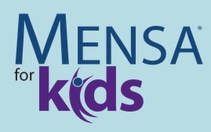
Start Small: From Ranker.com, "The Best Short Poems to Memorize" -- HERE.
Another list, "The Best Classic Poems for Kids to Memorize," is HERE.
One last list -- from Mensa for Kids -- is HERE.
April 12: Put a Line of Poetry (or a Quote about Poetry) in Your Outlook Email Signature
|
To celebrate National Poetry Month, add a line of poetry or a quote about poetry as part of your signature in your email. Pictured at the right:: How to add a signature in outlook. Of course, use a favorite line from a poem you love, or check out "The Fifty Most Quoted Lines of Poetry" (from 2012) from the Inky Fool -- HERE. From the article: "Shakespeare doesn't make the top ten and Gertrude Stein is more quoted than Byron. Bet you didn't see that coming." A more current list, "50 of the most poignant lines from poetry to read today" (from 2019), is HERE. |
|
April 13: Search for Poetry
|
Okay, here's something a little different -- and it's all for fun.
What are things you like? Ice cream? Horses? Shopping? Or what are topics you are interested in? The Civil War? Fashion? Jazz? Try a Google-search for poetry with the first two words being "Poetry about..." Then type in the subject of your choice and see what comes up.
Let's give it a try. Click on the buttons below to see the searches we ran on the topics we mentioned above: |
By the way, you know how Google tries to predict what you want?
Below are the suggestions Google made as I typed in the words, "Poetry about..." Are you interested in any of the topics that Google suggested? If so, give that search a try! |
April 14: Donate a Book of Poetry
We are certainly living in an unusual and uncertain time.
When we first landed on "donate a book of poetry" as a way to observe National Poetry Month, we were thinking of a more normal time when one could drop off a book at a school, a day care center, an assisted living facility, or a retirement home, where people could then gather and share or listen to poetry. Of course, now that we're all locked down and living in quarantine, could donating a book of poetry still be a meaningful way to celebrate the month? We think so.
Think about a far off friend. A lonely neighbor. A single parent with kids. A co-worker you see only on Zoom. A hero at a local hospital. A front-line employee working at a grocery store.
Why not send them a surprise, an unexpected book of verse filled with humorous poems or serious poems, children's poems or inspirational poems? We guarantee you will make them smile. We guarantee they will LOVE it! (And by the way, if you donate a book or send someone a book, they can celebrate poetry throughout the year!)
When we first landed on "donate a book of poetry" as a way to observe National Poetry Month, we were thinking of a more normal time when one could drop off a book at a school, a day care center, an assisted living facility, or a retirement home, where people could then gather and share or listen to poetry. Of course, now that we're all locked down and living in quarantine, could donating a book of poetry still be a meaningful way to celebrate the month? We think so.
Think about a far off friend. A lonely neighbor. A single parent with kids. A co-worker you see only on Zoom. A hero at a local hospital. A front-line employee working at a grocery store.
Why not send them a surprise, an unexpected book of verse filled with humorous poems or serious poems, children's poems or inspirational poems? We guarantee you will make them smile. We guarantee they will LOVE it! (And by the way, if you donate a book or send someone a book, they can celebrate poetry throughout the year!)
|
|
Donate or send a book today! Browse the titles at Charm City Books, HERE. They ship anywhere in the United States! Plus, if you order from Charm City, you'll be supporting a privately owned, indie-book store instead of one of those online mega-marts. |
April 15: Make Emily Dickinson's Cake
|
Hungry for some poetry? Try making Emily Dickinson's Black Cake.
From an article in the Washington Post: "This mega-cake recipe -- sized for gift giving -- is a modern adaptation of one created by Emily Dickinson; the 19th century poet learned to cook with her mother's guidance, it is said, and came to be quite good at it. The fruits used here are natural and the brandy syrup gives the fruitcake a moist, mellow kick." The article and recipe are HERE. By the way, they weren't kidding when they said "mega-cake recipe -- sized for gift giving": Servings: 60 Yield: (makes 4 large loaf cakes or 5 or 6 nine-inch rounds) |
|
From Food52.com, "17 Of Our Favorite Food Poems" are HERE.
From the Poetry Foundation, check out "Poetry & Food," HERE. |
|
Finally, try your hand at writing a "recipe poem." From Poetry Teatime: "Today’s poetry prompt is a recipe for disaster! Or a recipe for happiness, hope, making the perfect snow angel… You decide! All you need is a recipe and an idea." Click HERE.
|
|
Finally, share Emily Dickinson's cake and/or a book of "food" (i.e. poetry) with a friend.
Here's one example: "The Hungry Ear, Poems of Food & Drink (pictured at the right). if you're in self-quarantine (and/or if your friend is quarantined) due to the coronavirus pandemic, order the book "to go" HERE. They offer delivery! : ) |
April 16: Toast a Poet with a Literary Cocktail
|
Yesterday's post was all about food, so it's only natural that we turn to drink today -- and in this case, it is not about a "liquor never brewed" (did you catch that double negative...and our reference to Emmett Lee Dickinson's third cousin Emily?).
Let's start today's celebration with poems about margaritas -- HERE (and by the way, no other poet wrote more poems about margaritas than Emmett Lee Dickinson (Emily Dickinson's third cousin, twice removed -- at her request). Then, once it's cocktail hour, try whipping up one of these "25 Brilliant and Literary-Inspired Mixed Drinks," HERE. |
|
By the way, on the list of drinks linked above, we did not see "Tequila Mockingbird." However, you can order a copy of "Tequila Mockingbird, Cocktails with a Literary Twist" to be mailed directly to your home so you can mix up a whole host of literary libations while you're in quarantine!
Click HERE to order a copy through Charm City Books (plus you'd be supporting a charming indie-book store instead of one of those monstrous mega-marts). And while you're at it, wouldn't "Tequila Mockingbird" make a great gift for a friend? Cheers! |
|
For "Four Poetic Cocktails for National Poetry Month," click HERE (and yes, one of them pays tribute to our very own Emily Dickinson, Emmett Lee's third cousin).
Finally, we'll leave you with this -- certainly one of the BEST margaritas we have ever had -- the Coconut & Lime Margarita from Williams-Sonoma -- click HERE. Seriously. They are soooo good!
|
April 17: Read a Poem a Night
|
There are plenty of resources online if you search “poem a day,” and various entities offer just that, a “poem a day” – but give that concept a twist this month by thinking of it in terms of a “poem a night." So don't go gentle into that good night -- read a poem just before bed!
Poets.org offers a “poem a day,” HERE – and you can even sign up to receive a poem delivered each day to your email address. The Poetry Foundation offers a “Poem of the Day,” HERE. If you’re not in the routine of reading poetry, why not use the two resources (and/or others) to check out and read a poem each night. |
Here’s a list of 180 poems compliments of the Library of Congress, HERE. Of course, this list was originally intended to provide “A Poem a Day for American High Schools” (for 180 days of school). While it won’t get you through the entire year, it is a great place to start for a variety of poems. The Center for Literary Publishing also has “10 Places for Daily Poetry,” HERE.
|
If you want to get into the habit of reading a poem a night, how about reading "A Poem for Every Night of the Year"? You can order a copy HERE -- and you'll also be supporting a charming indie-book store -- and not a monstrous mega-mart. |
Whether or not you read a poem a night, you can also read poems about the night. PoemHunter.com has a collection of "Night Poems" -- HERE.
|
April 18: Play (& Create) "Mad Libs" Poetry
You know about Mad Libs, don't you? Mad Libs is "a phrasal template word game where one player prompts others for a list of words to substitute for blanks in a story before reading aloud" (that's the definition of Mad Libs at Wikipedia, HERE). Well, why not try it with poetry? We've made a sample for you, below.
|
Directions: If you're playing with another person, open the file, print it, and ask for the missing words -- then read the lines. If playing alone, jot down the words needed as described here first --and then open the file:
1. Past tense verb, noun, present tense verb, plural noun, and a plural noun. 2. Verb, noun, past tense verb, noun, and a noun. 3. Plural noun, present tense verb, noun, noun, plural noun, and a present tense verb. |
4. Plural noun, color, noun, verb, profession, and a past tense verb.
5. Adjective, plural noun, noun, and a verb. Once you have all of your words ready, open up the file:
Once you've had a chance to try out these five samples, print some of your favorite poems, create your own "Mad Lib" poems, and play with a friend!
| ||||||
|
After you've tried out the sample Mad Libs lines of poetry that we created, be sure to check out the Mad Libs website, HERE. |
April 19: Create a Book Spine Poem
Here's a great way to celebrate National Poetry Month if you are quarantined at home (especially if you have a lot of books at home): create a book spine poem!
Scholastic.com describes book spine poetry like this: "Book spine poetry is so simple but creates intriguingly artistic results. Just grab a bunch of books with interesting titles and stack them up to create a juicy column of poetry. Snap a photo of your masterpiece and presto, you’re done!:
Here are three examples I found by searching "book spine poetry":
Scholastic.com describes book spine poetry like this: "Book spine poetry is so simple but creates intriguingly artistic results. Just grab a bunch of books with interesting titles and stack them up to create a juicy column of poetry. Snap a photo of your masterpiece and presto, you’re done!:
Here are three examples I found by searching "book spine poetry":
Bookbub.com has many more examples, HERE. BookRiot.com has "The Best of Book Spine Poetry," HERE. Need to buy more books to stack? Click HERE.
April 20: Read (&/or Write) Poetry about Nature
Some of my favorite lines about the coming of spring are the first four lines of Emily Dickinson's "The skies can't think their secret":
|
The Skies can't keep their secret!
They tell it to the Hills -- The Hills just tell the Orchards -- And they — the Daffodils! Of course, there are probably countless poems about nature. I ran a Google-search on "Poems about nature," and the results are HERE.
Also, now that we're all living in varying degrees of quarantine, you can either visit an open botanical garden for inspiration and/or take a few pics on a nature walk near your home for inspiration (the four pics above and the four pics below are from a nature walk I took near my home yesterday). Pictured at the right: One can also find inspiration in books about nature. I found "Emily Dickinson's Gardening Life" at Charm City Books, HERE. The book traces a year of gardening at Emily Dickinson's home, and it reveals Dickinson's passion for plants and includes many of her poems of nature. |
|
|
If you want to write a nature poem, but you're not sure where to start -- take a look at this from wikiHow, "How to Write a Poem about Nature" -- HERE. Also, from WritersRelief.com, I found "5 Tips for Writing Nature Poems" -- HERE. The first tip elaborates on "Avoid the expected," and there are four more important tips to check out too. |
April 21: Check Out Some New Poets
|
If you celebrate National Poetry Month, then we suspect you have a favorite poet or two (or more) so why not broaden your views by reading the poetry of new poets? OR if you want to be recognized as a new poet, why not submit poetry to BestNewPoets.org?
"Best New Poets is an annual anthology of fifty poems from emerging writers. The anthology began in 2005 under series editor Jeb Livingood with George Garrett serving as the first guest editor." Check out their site, HERE. More information is HERE. If you think you have what it takes to be selected for their 2020 anthology, the competition is now open until May 15, 2020. You can submit your work here. |
|
Last September, Departures.com featured "New and Notable Poets to Look Out for in 2019" (pictured at the right). Check it out HERE. You can order any of these new poets' books HERE (and you'll also support an indie book store instead of one of those monstrous mega-marts). |
|
April 22: Download a Poetry App
Celebrate National Poetry Month throughout the month and throughout the year with a poetry app on your phone. We have not tried the apps below ourselves, but check them out at the App Store and download one or more of these -- or something similar.
The last app above, Weird Type, is not a poetry app per se, but an app for fun with words: "Have you ever wanted to draw with words? Weird Type is an AR app that lets you paint with text in space."
April 23: Host (or Participate in) an Online Poetry Reading or Poetry Slam
Just because most of us are still living in quarantine doesn't mean you can't host a poetry reading event or a poetry slam -- and if that sounds a bit intimidating, just start small. Host an event for your family and/or a few friends on Zoom. If you go a little larger than just family and a few friends -- especially if you share the link to your Zoom Poetry Fest publicly -- then be sure to include some security features: use a password, enable the waiting room feature, etc. If you plan to go big, then take a look at this "Zoom Safety Settings Checklist" -- HERE.
If you'd rather check out some online poetry readings (vs. hosting the event), check out the "Open Mic" and "Readings" info in this New York Times' article, "National Poetry Month Celebrations Go Online," HERE.
April 24: Celebrate Poets' Birthdays
William Shakespeare was born in Stratford-upon-Avon where he was baptized on April 26, 1564. His date of birth is unknown, but it is traditionally observed on April 23rd – so I s’pose I should have published this post yesterday: Celebrate poetry throughout the year by observing a poets' birthdays!
|
Pictured at the right: I Google-searched "famous American poets," and these are the names that came up -- along with their birthdays. Mark the dates of your favorites on a calendar and "Celebrate Poets' Birthdays" throughout the year -- I mean, who doesn't need an excuse to eat more birthday cake!
Also check out the following:
Ten of the Best Birthday Poems: HERE 64 Birthday Poems: HERE 10 of the Best Poems about Birthdays: HERE Birthday Poems: Hundreds of Happy Birthday Poems: HERE 52 Best Happy Birthday Poems: HERE And finally... 212 Best Birthday Poems images: HERE Below: When we Google-searched "famous American poets," look who popped up first! |
April 25: Check Out the Poetry of Banned Poets
What do Gwendolyn Brooks' "We Real Cool," "Alice in Wonderland," "The Canterbury Tales," and the poetry of Shel Silverstein have in common? At some point in history, they have all been banned.
According to Poets.org, "One of Gwendolyn Brooks’s most famous poems, 'We Real Cool,' was banned in schools in Mississippi and West Virginia in the 1970s for the penultimate sentence in the poem: 'We / Jazz June.' The school districts banned the poem for the supposed sexual connotations of the word 'Jazz.'" Read about this, and the poetry of other banned poets HERE.
According to Poets.org, "One of Gwendolyn Brooks’s most famous poems, 'We Real Cool,' was banned in schools in Mississippi and West Virginia in the 1970s for the penultimate sentence in the poem: 'We / Jazz June.' The school districts banned the poem for the supposed sexual connotations of the word 'Jazz.'" Read about this, and the poetry of other banned poets HERE.
|
The site Banned & Dangerous Art has an article entitled "Dangerous American Poets," HERE.
|
More on "Whitman, Alabama": "For two years, filmmaker Jennifer Crandall has crisscrossed this deep Southern state, inviting people to look into a camera and share a part of themselves through the words of Walt Whitman. The 19th century poet’s “Song of Myself” is a quintessential reflection of our American identities."
Finally, poetry in tribute to the American Library Association's Banned Books Week is HERE.
Finally, poetry in tribute to the American Library Association's Banned Books Week is HERE.
April 26: Follow a Poetry Hashtag on Twitter
Last year on April 26, when we presented Part 1 our "Poetic New Deal" (HERE), we suggested "Follow a Poetry Account on Twitter." Well, now Twitter allows an individual to follow more than just other individual accounts, Twitter peeps can now follow hashtags -- and there are plenty to choose from. Here are a few examples (plus, you can use and follow the same hashtags on Instagram):
|
#poetry
#poem or #poems #poetrycommunity #IidentifyAsAPoet |
#poet or #poets
#haiku #HaikuChallenge #PoemADay |
#micropoetry
#amreading #book or #books #literature |
|
< < < < Be sure to check out best-hashtags.com, HERE. The site lists the "most popular Instagram poetry hashtags," the "second most liked Instagram hashtags used with poetry," and the "top ten hashtags" to use on Instagram, Twitter, Facebook, Tumblr.
|
|
From Top-Hashtags.com, "Best Popular Hashtag to use with #poetry are #poetsofig #igpoet #poemoftheday #instapoem #words #poetrygram #thoughts #poem #poems #writersofinstagram . You should try these good hashtags in your Instagram or Tiktok post to get popular and boost your view." More is HERE. |
April 27: Enter a Poetry Contest
What's that old saying -- that you miss every shot you don't take? Well, I suppose the same is true about the prize money and awards for poetry contests -- you are guaranteed to lose every contest you don't enter. And who knows, maybe you will win one you do enter! : )
FanStory.com has a list of poetry contests -- HERE. TheWriteLife.com has "32 Free Writing Contests: Legitimate Competitions With Cash Prizes" -- HERE. For information on RealisticPoetry.com's monthly poetry contest -- click HERE. For more possibilities, just run a Google-search "poetry contests."
April 28: Write Poetry
|
Of course, the two easiest ways to celebrate National Poetry Month is to read poetry and to write poetry. hen it comes to writing poetry...
From HobbyLark.com, "Five Poetry Writing Exercises are HERE. From MasterClass.com, "9 Creative Writing Exercises for Poets" are HERE From WritersDigest.com,"3 Ways to Awaken Your Mind to Poetic Thinking are HERE |
From the Purdue Online Writing Lab, some "Poetry Invention Exercises" are HERE.
Here is the Generative Exercise #5 from the Purdue site: "The News Poem: When you want (or need) to be working on a poem, but you feel like you’re out of ideas, turn to the news for inspiration. Go to a major news website—NPR is great, but you could also use NBC, CNN, etc. Once you’re there, browse through the articles, reading (or listening to) whatever stories interest you. When you find one that really catches your attention, something that amazes you—something you can’t stop thinking about—you’ve found your topic. Free write your response to the story, and consider how it connects to your own life. Let yourself write in fragments, in paragraphs, whatever feels natural. Shape the draft after
Here is the Generative Exercise #5 from the Purdue site: "The News Poem: When you want (or need) to be working on a poem, but you feel like you’re out of ideas, turn to the news for inspiration. Go to a major news website—NPR is great, but you could also use NBC, CNN, etc. Once you’re there, browse through the articles, reading (or listening to) whatever stories interest you. When you find one that really catches your attention, something that amazes you—something you can’t stop thinking about—you’ve found your topic. Free write your response to the story, and consider how it connects to your own life. Let yourself write in fragments, in paragraphs, whatever feels natural. Shape the draft after
|
Take a look at this famous example: The March 31, 1910, edition of The Littleton Courier of Littleton, New Hampshire, carried the following story:
"Raymond Tracy Fitzgerald, one of the twin sons of Michael G. And Margaret Fitzgerald of Bethlehem, died at his home Thursday afternoon, March 24, as a result of an accident by which one of his hands was badly hurt in a sawing machine. The young man was assisting in sawing up some wood in his own dooryard with a sawing machine and accidentally hit the loose pulley, causing the saw to descend upon his hand, cutting and lacerating it badly. Raymond was taken into the house and a physician was immediately summoned, but he died very suddenly from the effects of the shock, which produced heart failure." {March 31, 1910] If you were to write a poem based on this event, what would you write? Robert Frost (pictured at the left) did write a poem about this event -- so after you’ve thought about what you would write, click HERE to see what Frost wrote (and see if you can guess the origins of his poem’s title too). For more information on this tragic event, from FindAGrave.com, click HERE. |
Need an idea to write about? From ThinkWritten.com, "101 Poetry Prompts" are HERE
There are plenty of other resources available! Just do a Google-search on “poetry writing exercises” or “poetry writing prompts.”
There are plenty of other resources available! Just do a Google-search on “poetry writing exercises” or “poetry writing prompts.”
April 29: Take a Poetry Class
Do you live near a university or community college? Do they offer classes for folks interested in a given topic -- say, poetry? Consider registering in such a course once we all come out of quarantine. In the meantime, though, why not investigate an online class in poetry?
|
Poet Ann Yu Huang offers "5 Reasons to Take a Poetry Class" -- HERE -- and also check out this informative article from Writers.com, "8 Things to Know Before Signing Up for an Online Poetry Class," -- HERE. This article also includes a list of upcoming online writing courses.
|
|
PalettePoetry.com offers "Poets' Resources: Online Classes" -- HERE -- and this list includes a range of classes from $ to $$$$. The article does mention one free opportunity -- the Harvard edX Poetry Courses -- but that link no longer works; however, I did find this on edX classes, HERE. There are plenty more "online poetry classes" when you run a Google-search -- click HERE. |
April 30: Plan to Celebrate Poetry All Year
National Poetry Month 2020 ends today, but you can plan to continue celebrating throughout the year. Check out these possibilities:
|
JANUARY: Have a Burns Supper on Robert Burns Day -- info HERE. Just FYI: Piper music generally greets the guests as they gather and mix. At less formal gatherings, traditional Scottish music is played.
FEBRUARY: Celebrate Black History Month by reading the poetry of African-American poets. Click HERE. MARCH: Celebrate World Poetry Day, a day to appreciate and support poets and poetry around the world. It is held on March 21 each year and is an initiative of the United Nations Educational, Scientific, and Cultural Organization (UNESCO). Information is HERE.
APRIL: In addition to being National Poetry Month, April also observes National Haiku Poetry Day on April 17. National Haiku Poetry Day encourages all to try their hand in creativity by writing Haiku poetry, a form of Japanese poetry that is non-rhyming and usually consists of 3 lines with a syllable pattern of 5-7-5. More information is HERE. Also, Shakespeare's birthday is celebrated on April 23rd. |
MAY: Star Wars Day on May 4th celebrates George Lucas' Star Wars. It is also National Metaphor Day: Metaphors Be With You! Okay, we just made that one up (National Metaphor Day); however, National Limerick Day is celebrated annually on May 12th, on the birthday of English artist, illustrator, author and poet Edward Lear.
JUNE: For Pride Month, celebrate the poetry of LGBTQ poets. Click HERE.
|
JULY: Every year on the last weekend of July, the New York City Poetry Festival invites poetry organizations and collectives of all shapes and sizes to bring their unique formats, aesthetics, and personalities to the festival grounds, which are ringed with a collection of beautiful Victorian houses and tucked beneath the wide, green canopies of dozens of century old trees. For information, click HERE.
AUGUST: Did you know that Bad Poetry Day is celebrated on August 18th? Well -- now you do. Click HERE. SEPTEMBER: National No Rhyme (Nor Reason) Day is celebrated on September 1st, and its focus is to recognize words which do not rhyme with any other words in the English language. Information is HERE. OCTOBER: October 12th is the birthday of America's greatest poet, Emmett Lee Dickinson (Emily Dickinson's third cousin, twice removed -- at her request). Information is HERE. NOVEMBER: World Nursery Rhyme Week is the third week of November, and it promotes the importance of nursery rhymes in early childhood development and education. Click HERE. |
DECEMBER: Celebrate Emily Dickinson's birthday on December 10th.
Before we close out the month, here are a few other bits of info of interest:
Before we close out the month, here are a few other bits of info of interest:
|
* Wikipedia has a complete "List of Years in Poetry," HERE.
You can click on any given year to discover what milestones in poetry occurred during that year. For example, the important events from 1890 in American and British poetry appear on the right (and the list includes the publication of Emily Dickinson's first edition of Poems, published posthumously). * An International Poetry Calendar is HERE. * Check out the TOP TEN events from "The 100 Most Important Events from the World of Poetry," HERE. |
Okay, that's a wrap, folks! We hope you have enjoyed our celebration of National Poetry Month and our presentation of the Poetic New Deal, Part 2 (Part 1 is HERE). If so, let us know -- and we hope to see you around these parts next April too!
For more ideas on how to celebrate National Poetry Month, check out the posts from our 2019 celebration -- HERE.

